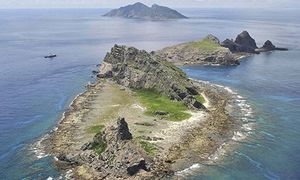 A simmering territorial and maritime dispute in Asia erupted at the weekend as Washington warned Beijing it would
back Japan militarily in any confrontation arising from China's latest unilateral assertion of its claims.
A simmering territorial and maritime dispute in Asia erupted at the weekend as Washington warned Beijing it would
back Japan militarily in any confrontation arising from China's latest unilateral assertion of its claims.
The Obama
In a tough statement reflecting the surprise and alarm felt in Washington and Tokyo at China's perceived sudden escalation
of the dispute, Chuck Hagel, defence secretary, said the US was "deeply concerned" at the development, in which China
appears to be trying to control who can
The imposition of the zone was a "destabilising attempt to alter the status quo in the region", Hagel said. "This
unilateral action increases the risk of misunderstanding and miscalculations ... We are in
Hagel reminded Beijing that the remote Senkaku islands, known as Diaoyu in China, are covered by the 1952 US-Japan security treaty, under which the US is committed to fighting alongside Japan to repel any "common danger".
On Monday China's foreign ministry said it had complained to the US about its "irresponsible remarks".
Foreign ministry spokesman Qin Gang said in a statement China had asked the US through its ambassador, Gary Locke, "to correct its mistakes and stop making irresponsible remarks on China".
Defence ministry spokesman Yang Yujun said the ministry had complained to the US embassy's military attache on Sunday evening.
Japan's deputy chief cabinet secretary Katsunobu Kato told reporters on Monday that China's declaration had escalated a tense situation.
"It can invite an unexpected occurrence and it is a very dangerous thing as well," he said. "The step just announced unjustly interferes with the freedom to fly above the open sea, which is a general principle under the international law. The measure is not enforceable to our country."
Washington's swift intervention showed just how easily a little local difficulty in the volatile east Asian region could potentially trigger a superpower clash. The Senkaku stand-off is but one of several similar disputes pitting a more assertive China against its less powerful neighbours.
Vietnam, the Philippines, Brunei, Malaysia and Taiwan (all US allies) are – like Japan – enmeshed in arguments with Beijing over relatively obscure but potentially strategic bits of maritime real estate.
These numerous flashpoints have led the Japanese government to describe the regional security environment as "increasingly severe". In response, Tokyo has been busily building up mutual defence and security ties across south-east Asia, and with Australia and India, as a hedge against Beijing.
For its part, China has sought to enlist Laos, Cambodia, North Korea and Myanmar as de facto buffer states while projecting itself as a rival to the US as a "blue-water" Pacific power.
Japan has denounced the zone set up by China on Saturday as "totally unacceptable", and indicated that aircraft from its self-defence force would ignore Beijing's attempt to oblige aeroplanes to obtain its permission before entering.
Fumio Kishida, foreign minister, warned that China's action "could well lead to an unforeseen situation". He called the development "very dangerous". Hagel said that US forces in the Pacific theatre, including those based in Japan and South Korea, would also ignore China's strictures.
China's foreign ministry called Japan's objections "absolutely groundless and unacceptable". It said it had made solemn representations to the Japanese embassy in Beijing.
The Chinese government-run Xinhua news agency published map co-ordinates for what it called the "East China sea air defence identification zone" covering most of the sea and the skies over the islands. It said China's armed forces would take "defensive emergency measures" against aircraft that failed to identify themselves properly or follow its radio instructions.
Xinhua claimed the "air zone could contribute to regional peace and security by curbing the increasing rampancy of Japan's right-wing forces, as well as the continuous and dangerous provocations of Japanese politicians, which even Washington should be vigilant against".
The statement was an apparent reference to Shinzo Abe, Japan's conservative prime minister, who was elected last December on a platform of standing up for Japan's rights. Abe, who says he is intent on making a "proactive contribution to peace", has been denounced in China and South Korea as a reckless nationalist and historical revisionist.
Although China and Japan share two-way trade worth $250bn (£150bn) a year and maintain many other bilateral links, Abe and the Chinese president, Xi Jinping, have yet to hold a summit meeting, and other high-level contacts remain frozen.
The dispute over the Senkakus, situated south-west of the Japanese mainland, dates back to 1971 when China claimed sovereignty. Up to that point, the islands had been under unchallenged Japanese control since the 19th century, although Taiwan also has a claim.The row escalated last year when Tokyo effectively nationalised some of the chain, purchasing two islands from private owners. The takeover provoked street protests in China and furious official condemnation. Since then there have been almost daily incursions by Chinese fishing boats and other non-military vessels.
Although tiny in size, the Senkakus are thought to sit on top of valuable energy deposits. But analysts say the outcome has broad implications for regional security, given that an ever more assertive China is prosecuting similar disputes with several other neighbours.
Akio Takahara, professor of international relations and law at Tokyo university, said: "[Senkaku] must be viewed as an international issue, not just a bilateral issue... and it is very, very dangerous. They [China] must stop the provocations. If Japan did buckle, it would send a very bad message."
In a foretaste of what could happen in the weeks ahead, China sent an air patrol into the zone shortly after the official announcement. Later on Saturday afternoon, Japan scrambled fighter jets after two Chinese reconnaissance planes appeared over the East China sea.
Source: http://www.theguardian.com/world/2013/nov/24/us-warns-beijiing-island-dispute-senkanus

/image%2F0994931%2F20220514%2Fob_0ba45b_picture-interview2.jpg)